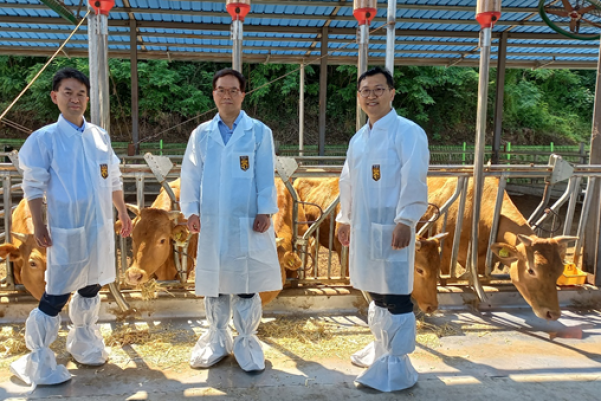Bio & Pharma
S.Korea's ToolGen develops gene-edited cow for artificial blood
Its partnership with Lartbio will supply such blood for research and raises the prospects for allergy-free beef
By Jun 21, 2023 (Gmt+09:00)
2
Min read
Most Read
LG Chem to sell water filter business to Glenwood PE for $692 million


KT&G eyes overseas M&A after rejecting activist fund's offer


Kyobo Life poised to buy Japan’s SBI Group-owned savings bank


StockX in merger talks with Naver’s online reseller Kream


Meritz backs half of ex-manager’s $210 mn hedge fund



South Korean genome editing developer ToolGen Inc. has teamed up with Lartbio Technology, a Seoul-based transgenic animal development company, to develop a cow to produce artificial blood for research that removes the risk of immune rejection.
Both companies on Tuesday said they developed a gene-edited cow for making artificial blood, adding that they will also produce another for use in xenotransplantation, or liver transplants between animals of different species.
When blood from cows and other animals enters human blood vessels, the body's immune system recognizes it as an enemy and attacks it. ToolGen and Lartbio created a gene-edited cow through the pre-removal of key antigens, namely antibodies, in the immune system that recognizes artificial blood as enemies using genetic scissors of clustered regularly interspaced short palindromic repeats, aka CRISPR.
This removes the risk of immune rejection, one of the biggest obstacles to xenotransplantation.
Both sides predicted that this could lead to the development of allergy-free beef with allergy-causing antigens removed and a supply of artificial blood from genetically modified cattle. The modified cows will be bred and managed at a test barn for living modified organisms at Gyeongsangbuk-do Livestock Research Institute in Yeongju, North Gyeongsang Province.
South Korea allows the use of blood from gene-edited cows only for research, so the commercial application of such blood is expected to greatly alleviate the global shortage. The World Health Organization said 119 of 195 countries cannot supply blood for transfusions in time, thus the world is ramping up the development of artificial blood.
In May 2021, the US Defense Advanced Research Projects Agency slashed the cost of raw material production through a project to develop artificial blood technology for wartime transfusions. In July last year, researchers at the University of Bristol of the UK successfully conducted the world's first clinical trial on transfusing artificial blood made from stem cells into humans.
"Our genetic scissors technology can be used not only on the artificial blood market, but also in xenotransplantation, treatment development, and animal and plant breeding," ToolGen CEO Lee Byong-hwa said. "We will collaborate with various companies in the production process."
Write to Jeong Min Nam at peux@hankyung.com
More to Read
-
 Bio & PharmaToolGen, ANLBIO to jointly develop progeria treatments
Bio & PharmaToolGen, ANLBIO to jointly develop progeria treatmentsDec 21, 2022 (Gmt+09:00)
1 Min read
Comment 0
LOG IN


